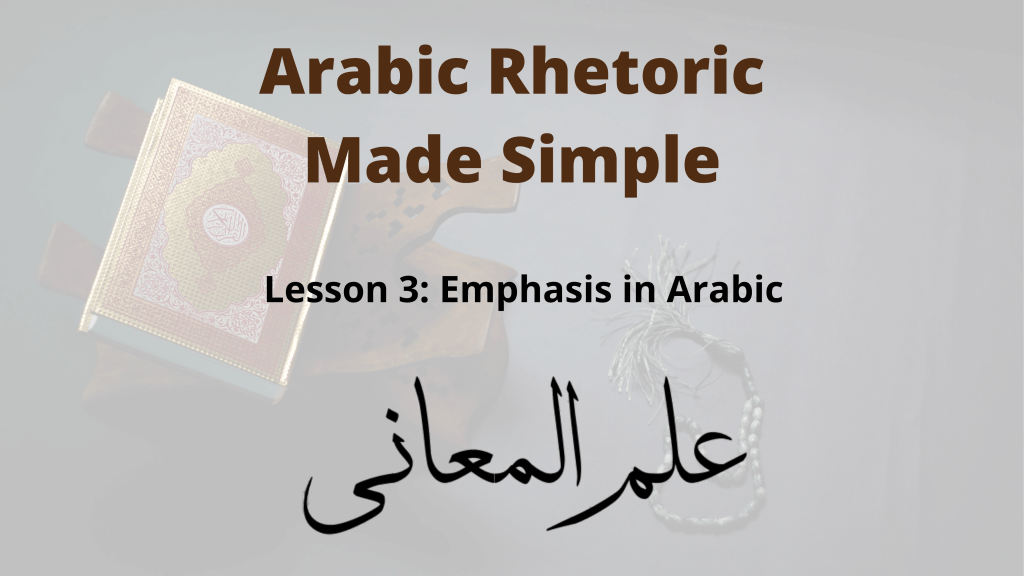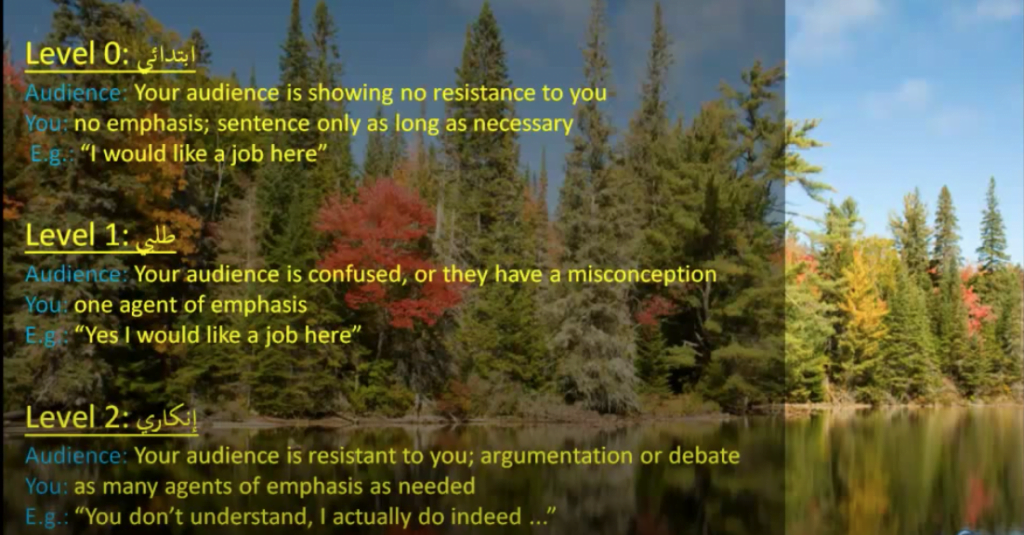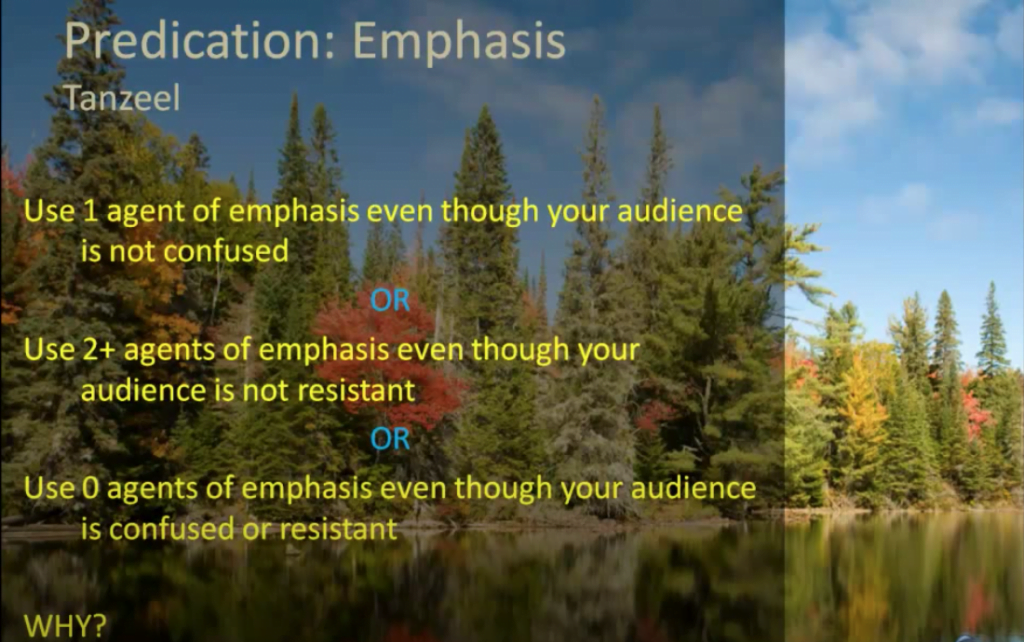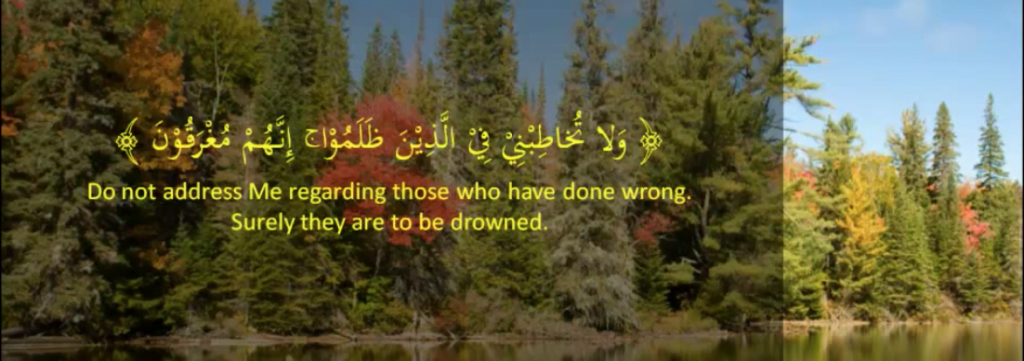
In this lesson on ilm ul-ma’ani we are going to continue talking about the things you need to consider when creating a sentence. In the last lesson we talked about the purpose of the sentence and here we are going to talk about how much force and emphasis you should be putting into your sentence.
When your audience is speaking to you, we like to divide them into one of three levels based on how much resistance they have to you.

- The first is level 0. It is called إبتدائى. This is when your audience is not showing any resistance to you. They are speaking very calmly and casually.
- Next is level 1. It is called طلبـى. This is where your audience is confused so they are asking you a question. Or even a little bit worse than that, they have a misconception.
- Finally, level 2 is إنكارى. This is when your audience is resistant to you. They are rejecting you and now you are sort of engaged in argumentation or debate.
The question is, given your audiences level of resistance to you, how should you formulate your sentence in terms of force and emphasis?
Level 0: إبتدائى
If your audience has no resistance to you, then obviously you should have no resistance to them. You should add no degree of emphasis. You should create your sentence only as long as it needs to be and you should speak calmly and in a very matter of fact tone. E.g. if you go into an office and you are looking for a job. You are speaking to your employer for the first time, you would say something like “I would like a job here”. You wouldn’t add degrees of emphasis. You wouldn’t say “Yes I am looking for a job here”. Imagine going up to someone for the first time and asking for a job and saying “Yes I would like a job here”. That’s just weird right? In some cases, it’s actually rude.
Level 1: طلبى
What about level 1, when your audience is confused?
The rules of balagha tell us that when your audience is confused it is good to use one degree of emphasis. If your potential boss says to you “You really want a job here?”, you would say something like “Yes, I would like a job here”. And if your audience is not just confused but actually, they have a misconception, then the rules of balagha tell us that not only is it good to add one degree of emphasis, but in the realm of balagha you have to add one degree of emphasis. If your boss turns to someone and says, “No, this guy doesn’t want a job here, he is just here to ask some questions”, you would say “No, I really do want a job here!”. You wouldn’t only use one degree of emphasis, but that degree of emphasis becomes mandatory and it might even be a stronger type of emphasis than in the first case.
Level 2: إنكارى
Finally, level 2. When your audience is rejecting you, you would need to use as much emphasis as necessary. Basically, you want to match their level of rejection with your degrees of emphasis. If your boss says “No, you don’t want a job here”, you would say, “No, you don’t understand, I do want a job here!”. Or if he says, “No, you’re not the type of person who would want a job here, please don’t waste my time, please get out”. You would say, “No, you don’t understand! I actually do indeed want a job here”. You have to match your level of emphasis with their level of rejection, because otherwise you won’t be taken seriously.
Imagine a potential employer saying to you, “No you don’t want a job here, get out!”. And you just say, “I want a job here”. You won’t be taken seriously.
So each level has it’s requirements.
If your audience is speaking to you normally, you should speak to them normally. You shouldn’t add any emphasis, otherwise you will sound weird and rude.
If your audience is confused, you only want to add one level of emphasis to remove their confusion and misconception. If you use zero levels of emphasis, you won’t be taken seriously. And if you use too much, again you will sound weird and rude.
Finally, if you are being rejected you want to add emphasis. You don’t want to keep your emphasis too low or have zero emphasis, otherwise again you won’t be taken seriously.
Let’s take a look at an example from the Qur’an. When the Prophet Eesa (peace be upon him) sent a couple of messengers to a people, they said the following:

The messengers of Eesa (peace be upon him) said, “Verily we have been sent to you”. They used two degrees of emphasis:
- Jumlah ismiyyah
- إِنَّ
But then they were subsequently met with a great deal of rejection. The people said “You are nothing more than mere men like us. And God hasn’t revealed a thing. You do nothing but lie”. That is a strong level of emphasis. So accordingly, the messengers used four levels of emphasis as opposed to their original two. They said, “Our Lord knows: We are definitely messengers surely sent to you”.
- Jumlah ismiyyah
- إِنَّ
- لَــ in لَمُرْسَلُونَ
- رَبُّنَا يَعْلَمُ which the People of Tafseer tell us stands in the place of an oath.
Emphasis: tanzeel
Now, something interesting happens. Remember when we were talking about the purpose of creating a sentence, we said that even though your audience knows the information you are about to deliver, you deliver it anyway to receive a rhetorical benefit. That rhetorical benefit is to show your audience that even though you know this, I am telling you because you might as well not know it since you are not acting upon your knowledge.

So something similar happens with emphasis. If your audience is not confused and they are not even rejecting you, you should be using no emphasis, but sometimes you might be using one or two degrees of emphasis.
Similarly, if your audience is rejecting you and the situation calls for a few degrees of emphasis, you might actually use no degrees of emphasis. You are going against the rules of balagha. This is called tanzeel and there are rhetorical benefits to this.
Let’s take a look at some examples of this counterintuitive use (or lack thereof) of emphasis to see what’s going on and get a better idea at what some of the rhetorical benefits are.
Allah is addressing the Prophet Nuh (peace be upon him):

After saying “Do not address Me regarding those who have done wrong”. Thereafter the situation calls for no emphasis. It should be “But they will be drowned”, very matter of factly, because Nuh (peace be upon him) is not asking a question, nor is he rejecting Allah.
Yet Allah says, “Surely they are to be drowned”. Why is that? Allah says to Nuh (peace be upon him) that do not talk to me about your people. i.e. I am upset with them, I am mad at them. Allah is pre-empting a question from Nuh (peace be upon him) where he would have asked, “so are they to be punished?”. Accordingly, Allah is answering, “yes indeed they are to be punished”. It is as if Nuh (peace be upon him) is confused and is asking the question. So, pre-empting the question is the rhetorical benefit.

This is another example where a poet from a tribe is talking about a man called Shaqiq, who is coming to his tribe and he was holding his spear horizontally as opposed to vertically. Then the poet says with emphasis that you know we do have spears too. Why did he use emphasis? Shaqiq is just coming to him, he didn’t even utter a word, yet this guy is using emphasis.
It is because Shaqiq is holding his spear horizontally. He should have been holding his spear vertically, indicating that he is ready for battle, but he is coming very casually, not prepared and not ready for battle. It is as if Shaqiq is saying that I don’t think you guys have any artillery or armaments. You are so weak I will just come to you without any preparation. So seeing his body language the poet is saying that these people do have spears.
- Proceed to next lesson: Literal and figurative in Arabic Sentences
- Return to index page: Intro to Ilm Ul-Ma’ani
- Start free lessons: Sign Up for Free Mini-class